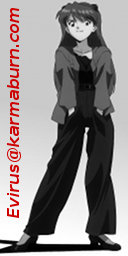|
|
- HOME
- Archive for J.C. Staff.
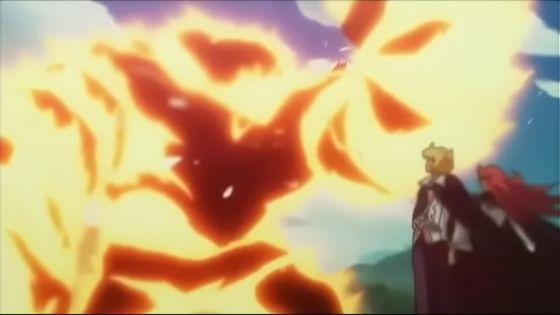
Works best against indolent opponents.
Alchemy. King of the Battle. Yeah, it doesn't quite work for me.
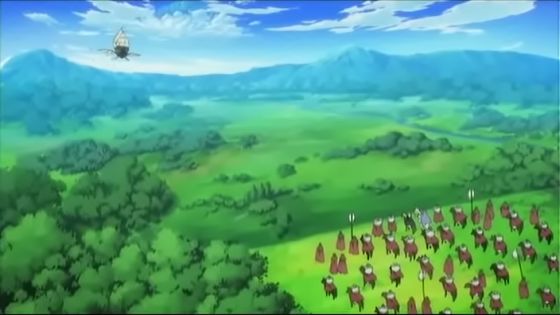
Y'all should have invoked the draft.
Our intrepid good guys are pretty lucky that there wasn't any decent artillery at this fight.
Zero no Tsukaima was pretty lackluster all around, I have to say. Not one of J.C. Staff's better works by any means. It was amusing enough, I guess, but nothing about it managed to keep my interest for very long. It also didn't help that a number of things about it were pretty irritating, like the sparkle-magic scene-transition noises, and the rather dull fight sequences.
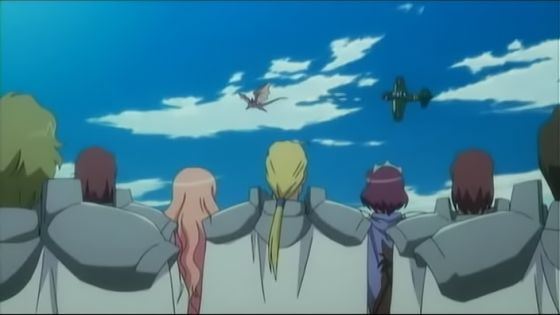
Indistinguishable from magic?
I do admit to getting a kick out of seeing Saito teeing off on a bunch of dragons with the Zero. I trust the "riding inside a Zero" and like jokes were lost on no one.
In other news, hey, it's a unicorn.
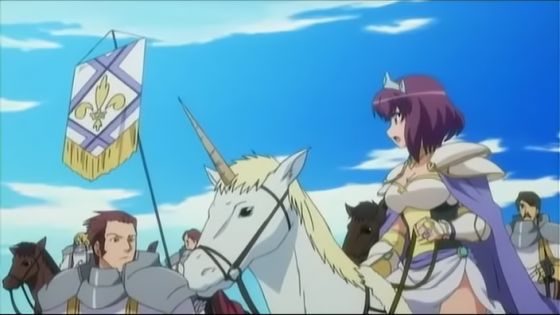
Virgin alert.
Posted in J.C. Staff, Zero no Tsukaima | | Permanent Link
As much as I complain about anime lacking realistic couples, and how frustrating it is that said couples are so adamantly platonic, I sure got tired of Bokura Ga Ita really fast. I blame a cast of unlikeable characters and an unsettlingly pastel color palette.
Actually, that's not true. I did like one character, but she didn't get much screentime, being dead and all.
And I can't really blame Bokura Ga Ita's pastel color palette, either, because Honey and Clover also has a pastel color palette (and an almost watercolor feel to almost every scene), and I can't get enough of Honey and Clover. I really should have started watching it earlier, because Honey and Clover is excellent.
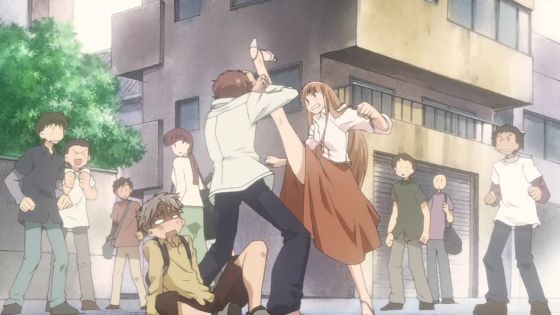
Yamada really isn't like Naru. Honest.
Now here's a show with realistic couples, and often painful themes of envy, despair, and the pangs of unrequited love. Not everyone in the cast is always likeable, but like real people, the characters in Honey and Clover have their good moments and their bad ones. For a show with such an idyllic title and such serene art (accompanied by beautiful music) there's an unexpected amount of pain in Honey and Clover.
I do mean that in the best of ways, because part of what makes Honey and Clover so good is its frankness in acknowledging that love and pain often go hand-in-hand—or perhaps it's more accurate to say that the show suggests that love and pain should go hand-in-hand. Yamada is the show's most sympathetic character because sometimes her love for Mayama is pathetic.
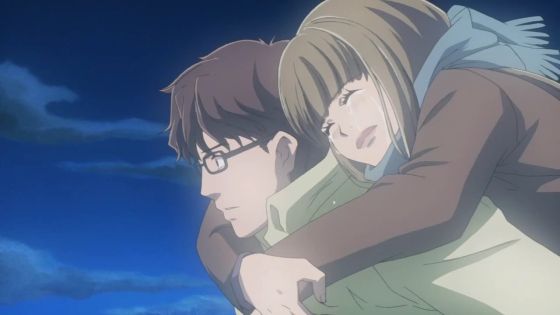
Mayama and Yamada.
Honey and Clover balances Yamada's character perfectly to generate sympathy from the viewer without inspiring contempt. This is just one of many successful balancing acts Honey and Clover artfully manages. The show also swings between comedy and drama skillfully, and juggles a number of different plot lines over the course of nearly 40 episodes. Actually, "nearly 40" is an inapt choice of words. Honey and Clover is consistently excellent, and could easily stand to run another 40 episodes if I had my say in the matter. Even then I suspect it wouldn't be enough.
Posted in Honey and Clover, J.C. Staff | | Permanent Link
Amazing. Volume 14 of the Ai Yori Aoshi manga was fully awesome.
If you've been following this site for a while, you may remember that I have a curious love affair with the wretchedness that is Ai Yori Aoshi. The anime is mostly mediocre, with a few really good moments, and a lot of really lousy ones. Still, I collected box sets of both seasons, purchasing or pre-ordering the DVDs individually. The anime exemplifies much of what is wrong with harem shows and contains stupid gimmicks and antics. I watch it anyway. This is because at the heart of Ai Yori Aoshi lies a vein of romance pure to the spirits of hope, love, and passion. But yeah, it's mostly shitty.
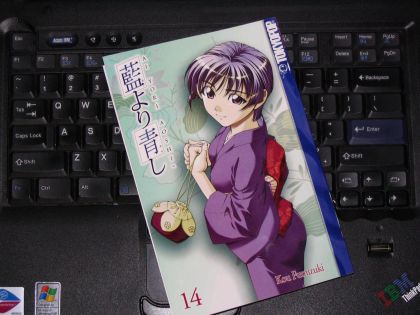
Ai Yori Aoshi manga volume 14.
However, the Ai Yori Aoshi manga is actually pretty good most of the time. It suffers from some of the same problems as the anime now and then, but at least it doesn't suffer from the disjointed narratives plaguing the episodes of the anime that tried to adapt extended manga plot lines via the dubious method of "just cramming everything all together." This isn't plot advancement; it's called "not making any sense."
In the Ai Yori Aoshi manga, the plot may advance slowly, but the plot does progress naturally. In volume 14, it leaps. I don't want to reveal the spoilers explicitly, but I will say that they involve the following aspects:
- You know how it doesn't make sense that after all this time nobody has found out about Aoi and Kaoru? Yeah, at least one person has known all along.
- The story arc in Enishi about Tina returning to America that was resolved in a single episode? It's much more extended in the manga and actually has a reason behind it.
- There's a bit of retconning regarding Tina's past, but it is consistent with other elements depicted thus far; it's conceivable that it was planned all along.
- Mayu confronts her feelings. (Mayu, you'll recall, has always been completely unguarded about her devotion to Kaoru...err...Hanabishi-samaaaaaaaaaaaa. For example, see how Mayu turned the tables on Tina in volume 13 with regard to the onsen prank. She's in love with him, and makes damn sure everyone knows about it. And how.) Anyway, the volume-14 bit about Mayu confronting her feelings is a little different than you might expect.
- Someone important to the plot dies.
- THAT'S RIGHT.
Oh, and there is a bonus side-story chapter about one of Chika's friends and her newfound May-December romance. So tawdry.
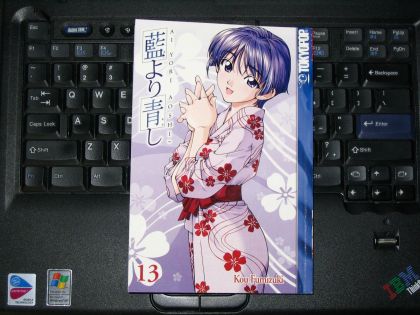
Ai Yori Aoshi manga volume 13.
Ai Yori Aoshi volume 14 is excellent, and Tokyopop's adaptation of it again finds zero complaints from me. All y'all should buy it, but if you haven't been reading the manga, you'll want to pick up volume 13 as well.
Posted in Ai Yori Aoshi, Manga | | Permanent Link
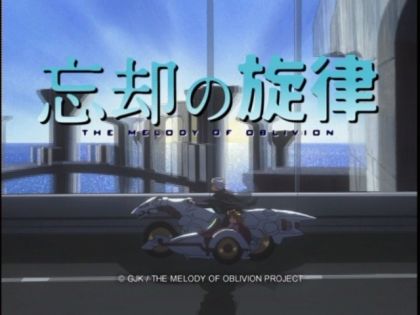
Boukyaku no Senritsu title screen.
Okay, the basics: The Melody of Oblivion is a joint J.C. Staff and Gainax production about a post-apocalyptic future. Mankind has lost the war against the Monsters, but seems content now to live quietly under their subjugation. Most people just want to go about their lives, ignorant of the Monsters and their dealings.
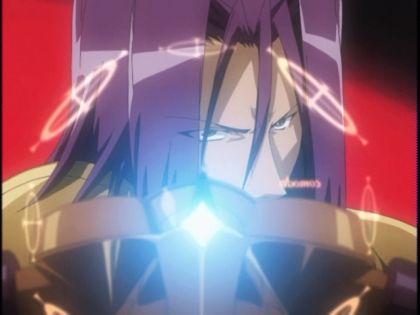
Kurofune.
However, there are a few Melos Warrior around who fight the good fight, mostly alone, and wandering as drifters.
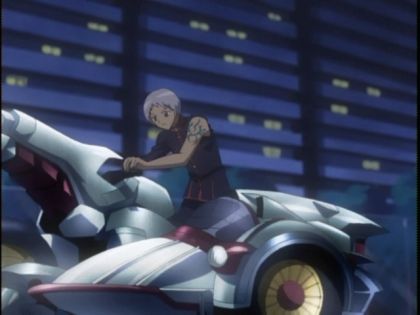
Bocca.
Enter Bocca, a disaffected boy unhappy with the banal trivialities of school life, and frustrating efforts of those around him to shape him to their will.
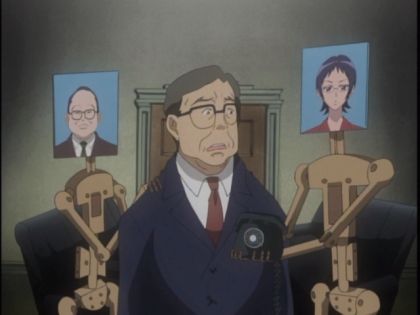
These aren't robots.
As for the rest of the show, it is about monsters, and music, and mythology, and motorcycles, and archery, and poker, and love, and freedom, and child sacrifices, and FREAKY FREAKY SHIT. Oh, and karaoke. This is what happens when you let Gainax weird up a J.C. Staff show.

It's a bull, it's a bus. I don't know.
You can immediately tell that The Melody of Oblivion is going to be a different type of show right from the start. You'll notice that the backgrounds are watercolors. And this is all before it starts getting weird. And get weird it does.
I haven't watched The Melody of Oblivion since the now-defunct Rice-Box fansubbed it, but I'm pleased with Geneon's DVDs and happy for an excuse to re-watch the show. The first DVD itself is packaged in a transparent case with reversible covers and the insert contains a cheesecake centerfold of Sayoko. I don't have any issues with the DVD itself, but I do think "RESOUND, MY MELOS!" was a better choice than "RING OUT, MY MELOS!" At the very least, "ring out" doesn't seem as appropriate for the Melos Warriors' stringed instruments/weapons. It's an odd enough choice that it makes me wonder if somewhere along the line a decision was made not to use either resound or echo in order to avoid the appearance that they had "copied" the fansubs.
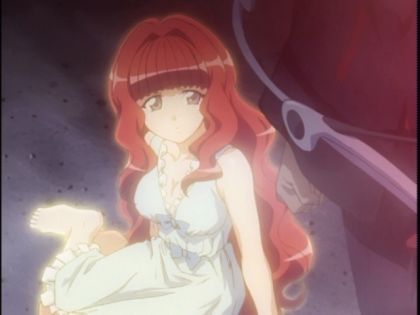
The mostly invisible Melody of Oblivion.
Rest assured that "VIVA! MONSTER UNION!" is unchanged, being in English originally and all. However, "JUST FIT RIBS" is now "JUST FIT RIM" in the DVDs (not that that makes any more or less sense), until the third disc anyway where it is "JUST FIT RIB." Additionally, I notice the first DVD made the same mistake as the early fansubs in using FLASH instead of FLUSH. (It becomes apparent later on that the Melos Warriors are shouting poker terms when initiating their attacks.) It's fixed by the second DVD, though. Incidentally, Toune is spelled Tone in Geneon's subtitles. That makes a lot more sense, really.
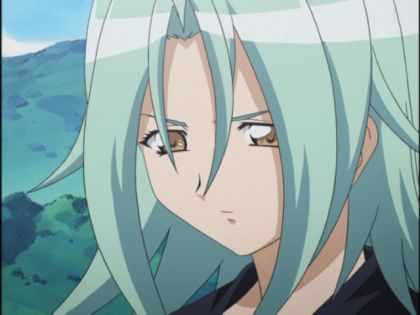
Tone.
As is appropriate for a show about music, the soundtrack is quite good. I especially like the the ED.
It's also kinda nice that they got Yuji Ueda, Kana Ueda, and Mai Nakahara (among others) to voice minor throwaway characters instead hiring random scrubs. The vocal cast as a whole is quite talented, in fact.
The Melody of Oblivion is a hard sell, I understand, but I like it a great deal. J.C. Staff could have benefitted from some of this Gainax weirdness in Oku-sama wa Mahou Shoujo, and they definitely needed it in their rather insipid Zero no Tsukaima recently.
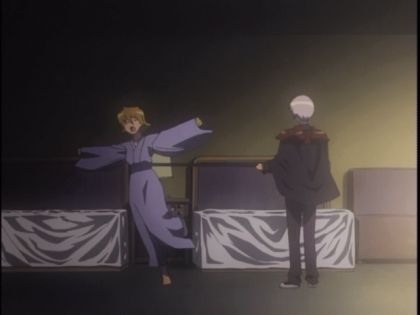
Sayoko and Bocca.
Also, any show that features obi-spinning by the third episode is all right by me. Oh yeah, and there's fanservice.
Posted in Gainax, J.C. Staff, Melody of Oblivion | | Permanent Link
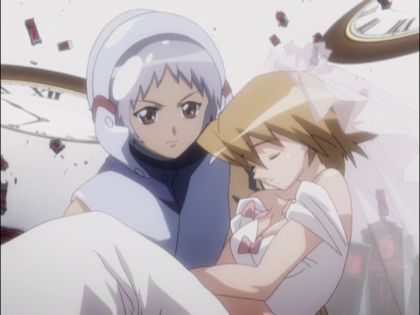
Bocca and Sayoko.
The last DVD of The Melody of Oblivion is SO WEIRD. I can't even really begin to explain it. The Melody of Oblivion was already a weird series to begin with, but the last last four episodes take the peculiarity to another level.
Are the episodes good? Yes. I can assure you of that much. But I also can't present a bunch of random screenshots and expect those of y'all who haven't watched the series to understand just what makes the series SO WEIRD. Thus, I've posted the two least weird screenshots I had—ones that don't feature karaoke or girls being milked.
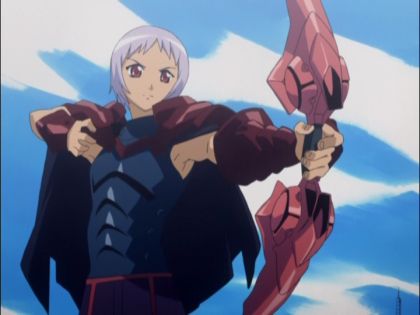
Bocca.
I also have my own theories as to what happened at the end of the The Melody of Oblivion, but I understand others may embrace different interpretations.
P.S. BIO CONCERTO.
Posted in Gainax, J.C. Staff, Melody of Oblivion | Tags: Gainax Ending | Permanent Link
Nodame Cantabile caught my attention because Amazon.com has been pushing the manga on me for years. Also, AYAKO DOCTRINE. Seeing as how I was one of the few people to enjoy Piano a few years back, it was pretty much a no-brainer that I was going to give the Nodame Cantabile anime a try.
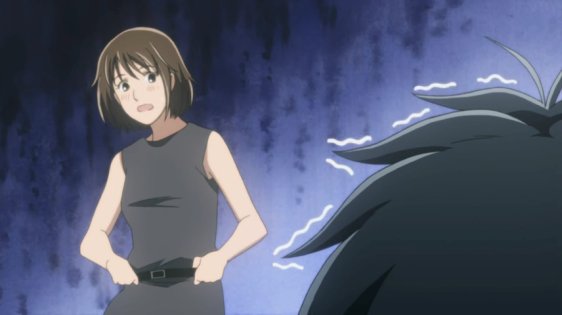
Nodame vexes her senpai, Chiaki.
Kawasumi Ayako voices the titular Noda "Nodame" Megumi, an unconventional pianist at a music school. This is a very chipper Ayako at work here—quite a welcome change of pace from what seems like a significant block of serious characters. For those of you who watched Piano, Nodame is the anti-Miu. Kawasumi Ayako probably does not play the piano here for Nodame, though; I'll be quite impressed if she's this accomplished.
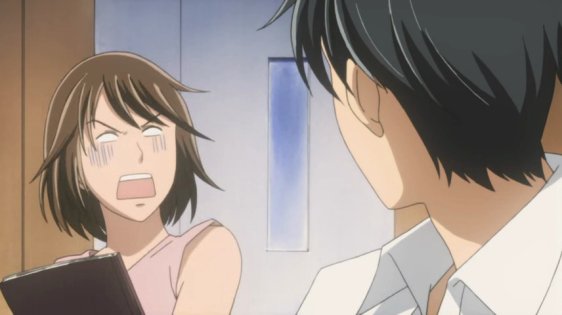
Chiaki vexes Nodame.
Nodame Cantabile is basically Honey and Clover III. Both shows being J.C. Staff productions, I'm sure the familiarity is deliberate. Hopefully, Nodame Cantabile will be as good as Honey and Clover. I'm not too worried since the source material is supposed to be good, and I found the first episode to be entertaining and funny. No doubt there will be love triangles and more serious fare down the road, but I'm confident J.C. Staff will handle them with aplomb.
In related news: Dang, I'm going to start buying classical music CDs again, and it's going to be Nodame Cantabile's fault.
Posted in J.C. Staff, Nodame Cantabile | Tags: AYAKO DOCTRINE | Permanent Link

Eika from Sky Girls.
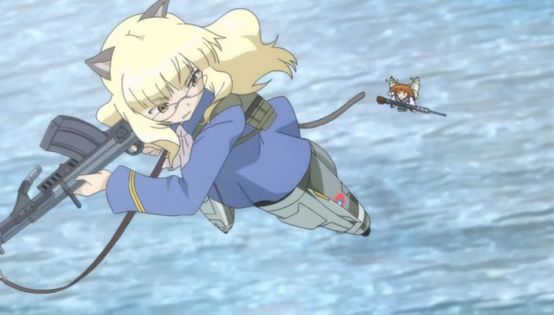
Perrine-H. Clostermann and Yoshika Miyafuji from Strike Witches.
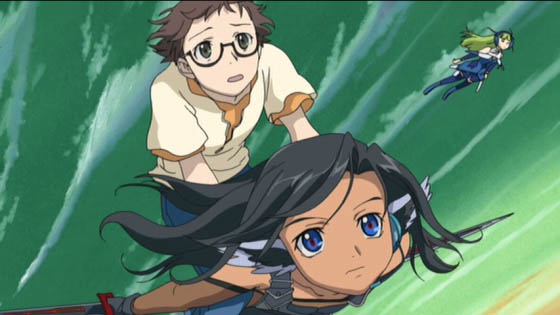
Sentou Yousei Shoujo Tasukete! Mave-chan.
Having seen all three, I can say that the Strike Witches prelude has a superior score, and is better in that it has propeller and machine gun sound effects, but is otherwise inferior to Sky Girls in nearly all other aspects. However, the comparison is somewhat academic because Sentou Yousei Shoujo Tasukete! Mave-chan owns them both.
Posted in Mave-chan, Sky Girls, Strike Witches | Tags: Air Power, Mecha Musume | Permanent Link
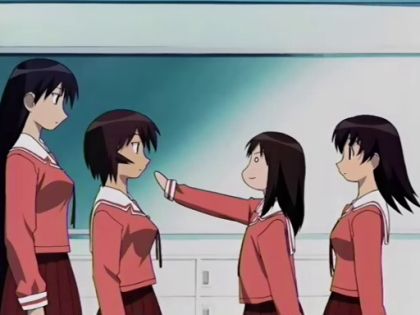
This is not a Danbooru breast-comparison chart.
I'm re-watching Azumanga Daioh again. This time I'm leaving my ADV DVDs on the shelf, and just watching the Triad fansubs—partially because of ADV's "MISS SAKAKI" faggotry, but also because I find it entirely too inconvenient at the moment to swap DVDs and cycle through pointless menus, etc.
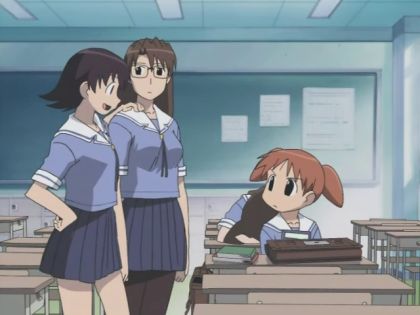
Tomo, Yomi, and Chiyo.
E/N Warning: I originally watched Azumanga Daioh during an especially demanding time. I didn't really have time for, well, anything...but I sacrificed sleep to watch episodes of Azumanga Daioh because the show always made me laugh my ass off.
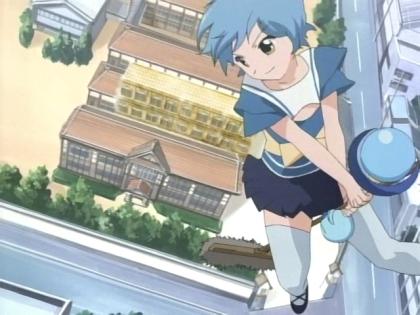
Sayaka from Oku-sama wa Mahou Shoujo.
As an aside, those of you who really enjoy the music in Azumanga Daioh are encouraged to give another J.C. Staff series a try: Oku-sama wa Mahou Shoujo. It's a vastly underrated series, which suffers because it didn't capture the attention of a better-known fansubbing group, and because its initial episodes are a little overt with the fan service levels. Oku-sama wa Mahou Shoujo is no Azumanga Daioh to be sure, but it is amusing enough, and the background music is very similar.
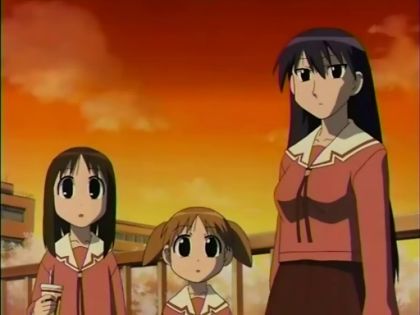
Osaka, Chiyo, and Sakaki.
Actually, I ended up marathoning Azumanga Daioh before I finished writing this entry. My original review still stands. I don't think I even have much to add, except perhaps this:
In light of this year's fervor over Suzumiya Haruhi no Yuuutsu, it is important to remember the tremendous fanbase devoted to Azumanga Daioh during its prime. That Bandai enjoyed great success with its The Melancholy of Haruhi Suzumiya launch compared to ADV's Azumanga Daioh failure is at least partially attributable to the degree to which ADV fucked it up.
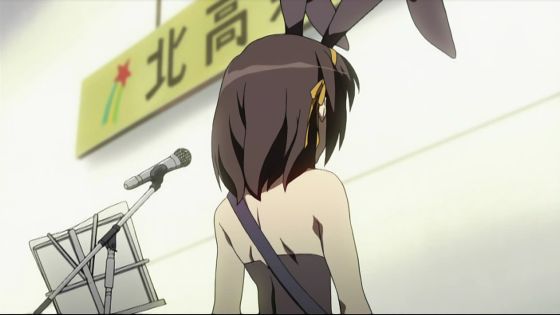
Haruhi.
Certainly the timing of the sales and the expansion in the market itself over the years contributed to the differences in the two North American releases, but it should be obvious to fans of both shows that ADV's stumbles marketing Azumanga Daioh coupled with the MISS SAKAKI-type curiosities seriously cost ADV a tremendous opportunity. I'm not going to break down the differences point by point, but a large one to consider is Bandai's (at least tacit) willingness to embrace (and market directly to) fans of the show who had already seen it via downloading fansubs or streaming YouTube—a sharp contrast to ADV's doctrines.

Yukari and Nyamo.
Think of it as the triumph of Web 2.0 mumbo jumbo versus the old and busted obstinate way of doing things. ADV, like everyone else, knows fansub-watchers buy DVDs. Think of it this way: Every series offered with a "collector's box" edition of the set's first DVD is obviously geared towards people who have already watched and enjoyed the show. Who else would buy the collector's box edition of a show they had never seen? Wouldn't it make more sense to offer the collector's box with the last DVD? And yet, although ADV will grudgingly acknowledge the inspired-by-fansubs market exists, it won't (or at least didn't) embrace it.
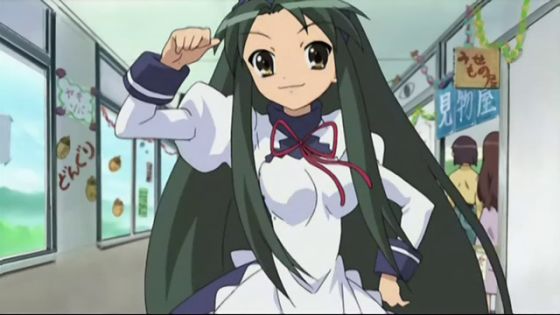
Tsuruya.
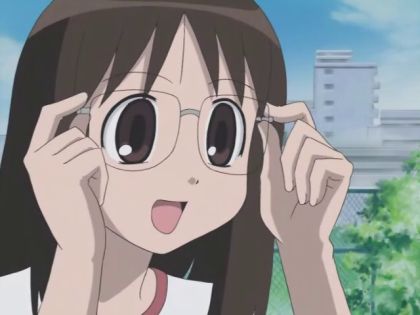
Osaka is actually a genius. I swear.
For neophyte anime fans who are only still reading this because I mentioned The Melancholy of Haruhi Suzumiya, you should also watch Azumanga Daioh because Tsuruya's seiyuu, the megas-talented Matsuoka Yuki, also voiced (the vastly different) Osaka.
Posted in Azumanga Daioh, Melancholy of Haruhi Suzumiya, The, Oku-sama wa Mahou Shoujo, RECOMMENDATIONS, Seiyuu | Tags: ADV, Asakawa Yuu, DVDs and Blu-ray discs, Hirano Aya, J.C. Staff, Mahou Shoujo, Matsuoka Yuki, May-December Romances, Music, Re-Watching, Spring 2002, Spring 2006, Summer 2002, Summer 2005 | Permanent Link
|
|






